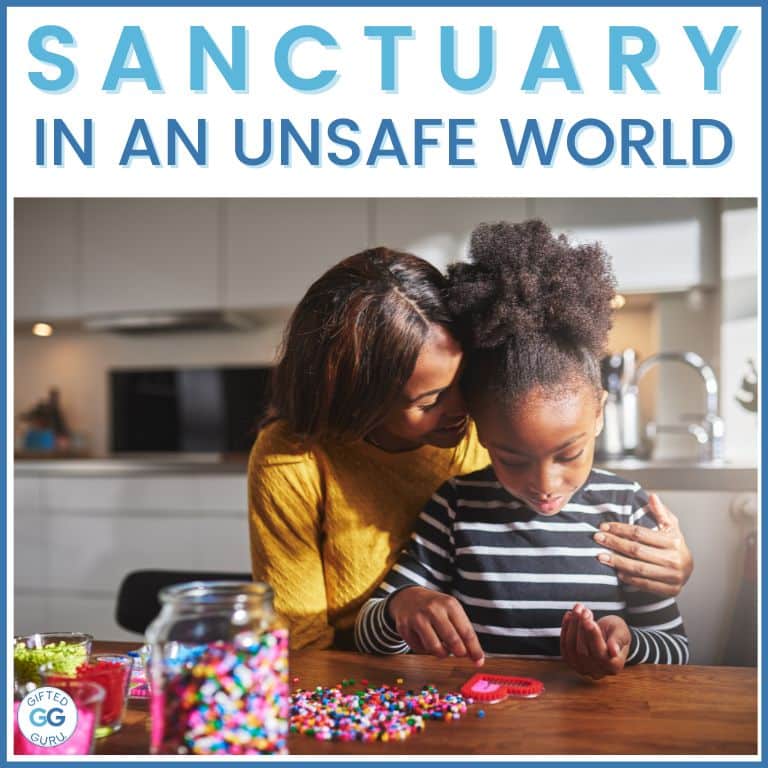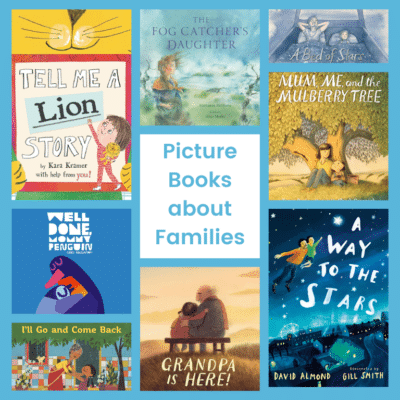When I wrote this article in the summer of 2011, I had no idea that its ideas would become even more necessary over a decade later. As the world feels increasingly complex and emotionally unsafe, finding peace in a troubled world (and helping children find peace in a troubled world) becomes even more important.
It has become one of the most powerful teaching and parenting skills we need to develop.
This article shares ideas on how we can accomplish just that. How can we find sanctuary in any circumstance?
In Victor Hugo’s classic novel The Hunchback of Notre Dame, Quasimodo carries his one true love into the cathedral of Notre Dame for protection under the law of sanctuary. His plan ultimately fails, but the idea of sanctuary, or a place of safety, endures.
We all need and seek sanctuary – havens of security where we can be ourselves without fear. For gifted kids, that sanctuary can be hard to find. I’m not comparing gifted kids to Quasimodo – just their circumstances.
Even among gifted peers, children may not find kids who share the same interests, and so their intelligence becomes the only common denominator between them.
How can we help high ability kids find sanctuary? Here are five ideas for helping a gifted child find a place of social safety in a world that is increasingly unsafe for them:
1) Find Sanctuary at Home
We simply cannot overstate the impact of acceptance of a gifted child’s unique ability and interests within the home. This does not simply include the immediate family, but the extended family as well.
Some grandparents may compare high ability grandchildren with those of more typical ability and create an unhealthy dynamic in which achievement is praised, but what is perceived as undesirable behavior in the form of questioning authority, etc., is not.
How can we help extended family understand the gifted child? The same way we learned…connection, reading, discussion. We can pass on articles we find, we can share podcasts, we can recommend or gift books (that’s my Amazon store where I share books for adults). We can share videos we found helpful.
We can also examine ourselves closely to make sure we’re not excusing poor behavior that can be corrected simply because a child is gifted. Gifted and pleasant to be around are not mutually exclusive.
2) Finding Sanctuary at School
If there is a gifted parents group, join it. If not, start one – either for your campus or for the district.
With the pervasiveness of social media, it is not expensive to connect with people.
- Set up a table at open house and be amazed.
- Find out what kids are participating in the activities associated with high ability – Destination Imagination, chess clubs, reading round-ups, Math Counts, etc. – and try to connect with their parents. Even if your child is not interested in that particular activity, you may find that they have other common interests.
- Invite kids over to actually do something, rather than just “play.” People connect when they are engaged together. Make no-bake cookies. Do a science experiment. Have a game night. Try different popcorn toppings. Make the environment conducive to connection by making it active.
3) Finding Sanctuary in Community.
One hallmark of high ability kids is their refusal to recognize the division between old and young. They are more than willing to have authentic conversations with older people.
Use this to your advantage.
Find activities in the community, either through the library, parks department, or other civic organizations, that interest your child and don’t be put off by the fact that the other participants may be older. Much older.
One friend of mine took her son who is obsessed with trains to a model train group where the average age of participants is about 70. He fit right in.
If your son likes to knit, find knitting groups. If your daughter likes to practice her German, find a gruppe.
You may need to attend with the child, but that’s okay – you’ll learn something, too.
4) Join.
Join NAGC and your state affiliate. Affiliate with SENG. Sign your kid up for Mensa. You may find others in your area who are also struggling with the same issues.
In my role as Mensa’s Gifted Youth Ambassador, I would say that the number one request I got from parents is information on how they can connect with others in their area.
By attending events, connecting through social media, chatting by email, or talking on the phone, you can shorten distances between people, rendering geographic distance no hindrance to connection. Through services like Skype, Zoom, or epals, your child can make friends around the world.
Do all of your friends live down the street? Of course not. In today’s world, we don’t necessarily even see our friends who live close by any more often than those who live far away.
Strange, but true. The upside of this is that distance is no longer a barrier.
5) Developing the Skills of Sanctuary
Finding sanctuary in ourselves is a skill that can be developed. It’s composed of micro-skills that combine to create resilience. Those skills include:
- Learning to make and keep friends: Help your child develop the social skills necessary to find and make friends, even if there are no soul mates in your area.
- Teach active listening, sharing, how not to dominate a conversation (um, still working on this myself), and being willing to try new things.
- Share stories of people you met who became good friends as you got older. Take advantage of transition times (beginning of school years, beginning of summer, holidays, a move, etc.) to try to reach out to new people so children learn that friend-making is not a spectator sport.
- See if you can help your child plan for the upcoming school year with not only academic, but also social planning. Where is he/she most likely to find friends? How can he/she hold off judgment on whether someone would be a good friend or not long enough to give the person a chance?
- Enlist the teacher to help. Explain that you are looking for friends for your child, and ask if he/she would keep an eye out. The teacher probably knows kids in other grades and classes and may be in a good position to notice similarities in interests or personality. If so, ask the teacher to share your contact information with the other parent.
Through reaching out and planning, our children can find sanctuary in our hectic world, even without the gargoyles of Notre Dame. As parents and teachers, we have incredible power to make the world a safer place for children emotionally, no matter what chaos swirls around us. And that thought should bring us peace as well.
(This article was updated 18 October 2022.)




